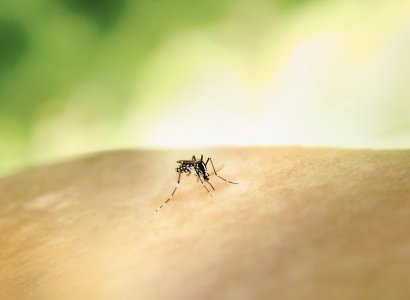Are you using the wrong mosquito repellent? Only two things actually work
- Replies 0
They’re tiny. They’re relentless. And no summer evening is safe from them.
If you’ve spent June being eaten alive while citronella candles flicker uselessly nearby, you’re not alone.
Mosquitoes have become the ultimate backyard buzzkill, and the shelves are packed with “miracle” repellents that claim to fix it—zappers, wristbands, ultrasonic devices, even essential oil sprays with names that sound like luxury perfumes.
So what actually works?
According to experts and the science behind them, it’s not complicated. You only need two things to stop mosquitoes from crashing your cookout:

Before we get to the real solutions, let’s call out the popular methods that waste your time and money:
Also read: Update: CDC urges caution on vaccines for this unfamiliar mosquito-borne illness —Here’s what’s changed.
1. Bug Spray with Proven Ingredients
Bug spray is the least exciting option on the shelf. But when it comes to avoiding bites, it’s still the most effective.
Look for sprays that contain one of these three ingredients:
Also read: Health alert: Virus tied to birth defects and paralysis resurfaces in top travel spot
2. A Regular Fan
This might sound too simple—but it works. Here’s why: mosquitoes are weak flyers. They rely on still, humid air to land and bite. Add a breeze—natural or not—and they’ll struggle to stay airborne.
Set up a box fan or oscillating fan near your patio, porch, or picnic blanket. Aim it at the area where you’re sitting. You’ll cool off and create a no-fly zone. It’s chemical-free, immediate, and incredibly cheap.

Do you have a favorite brand of spray? A secret weapon for the porch? Maybe your fan doubles as a backyard DJ booth (in which case, please invite us). Drop your hacks, fails, and questions in the comments. The GrayVine hive-mind is smarter than any mosquito.
If you’ve spent June being eaten alive while citronella candles flicker uselessly nearby, you’re not alone.
Mosquitoes have become the ultimate backyard buzzkill, and the shelves are packed with “miracle” repellents that claim to fix it—zappers, wristbands, ultrasonic devices, even essential oil sprays with names that sound like luxury perfumes.
So what actually works?
According to experts and the science behind them, it’s not complicated. You only need two things to stop mosquitoes from crashing your cookout:
- A bug spray that’s actually proven to repel
- A simple fan

Mosquitoes have become the ultimate backyard buzzkill Image Source: National Institute of Allergy and Infectious Diseases / Unsplash
Before we get to the real solutions, let’s call out the popular methods that waste your time and money:
- Citronella candles
Smell great. Repel mosquitoes? Not really. They perform about the same as unscented candles—which is to say, not at all. - Bug zappers
You’ve probably seen one crackle at night and felt triumphant. But they attract insects with light—mosquitoes aren’t interested. Zappers mostly kill the good bugs you want around. - Wristbands
A repellent wristband protects…your wrist. Unless you’re planning a full-body wrap, they won’t help much.
Also read: Update: CDC urges caution on vaccines for this unfamiliar mosquito-borne illness —Here’s what’s changed.
The only two that work
Let’s talk about what does keep mosquitoes away—and why it works.1. Bug Spray with Proven Ingredients
Bug spray is the least exciting option on the shelf. But when it comes to avoiding bites, it’s still the most effective.
Look for sprays that contain one of these three ingredients:
- DEET
It’s been the gold standard for decades. Despite outdated fears, it’s safe when used correctly and highly effective. Go for 7–15% for everyday backyard use. Higher for camping or swampy areas. - Picaridin
Just as effective as DEET, but less greasy and with a lighter scent. A solid option for sensitive skin. - Oil of Lemon Eucalyptus (OLE)
A plant-based repellent that works surprisingly well—though not as long-lasting as DEET or picaridin.
Also read: Health alert: Virus tied to birth defects and paralysis resurfaces in top travel spot
2. A Regular Fan
This might sound too simple—but it works. Here’s why: mosquitoes are weak flyers. They rely on still, humid air to land and bite. Add a breeze—natural or not—and they’ll struggle to stay airborne.
Set up a box fan or oscillating fan near your patio, porch, or picnic blanket. Aim it at the area where you’re sitting. You’ll cool off and create a no-fly zone. It’s chemical-free, immediate, and incredibly cheap.
Bonus hacks for a mosquito-free yard
Bug spray and a fan will protect you—but if you want to make your space less mosquito-friendly overall, here’s what else helps:- Dump standing water
Buckets, birdbaths, plant saucers—anything that holds rainwater becomes a mosquito nursery. - Set a “Bucket of Doom”
Fill a bucket with water and some grass clippings, let it ferment for a couple days, then toss in a mosquito dunk (a safe bacterial larvicide). Females will lay eggs, but the larvae won’t make it.
Key Takeaways
- The only scientifically proven mosquito repellents are EPA-registered bug sprays and fans that create airflow.
- Common products like citronella candles, zappers, and ultrasonic devices don’t offer reliable protection.
- Sprays should contain DEET, picaridin, or oil of lemon eucalyptus to actually work.
- Reduce mosquito populations by removing standing water and trimming overgrown vegetation.






